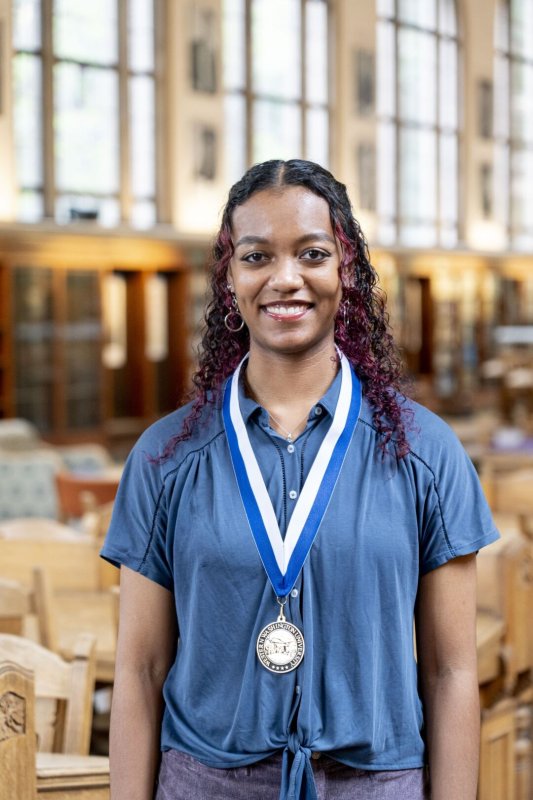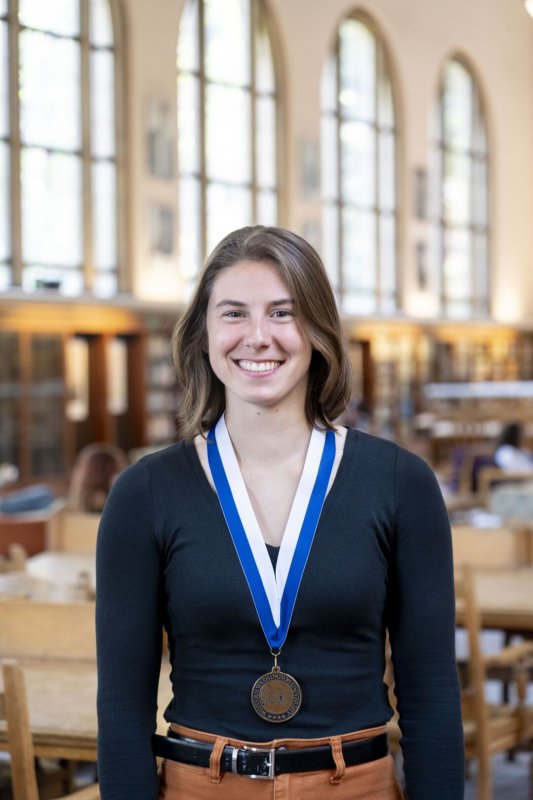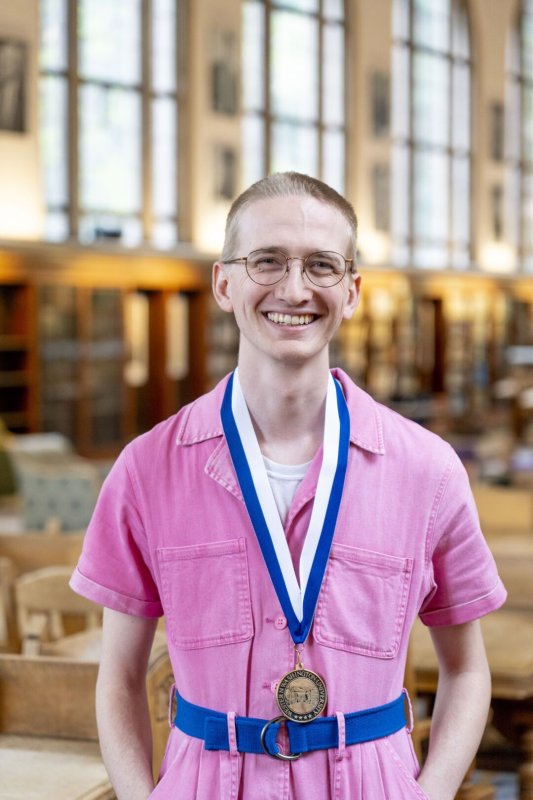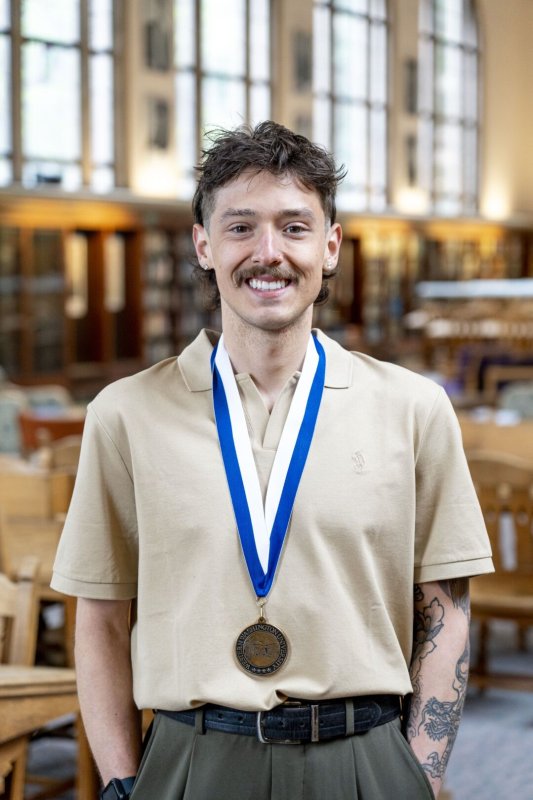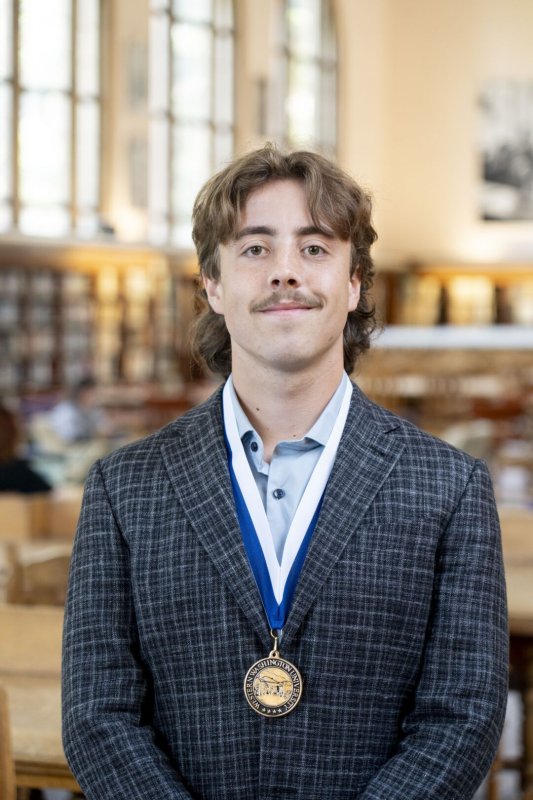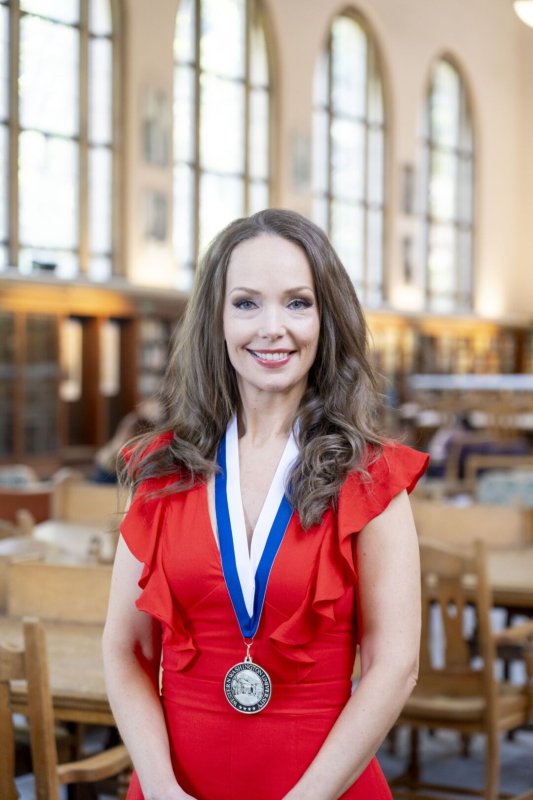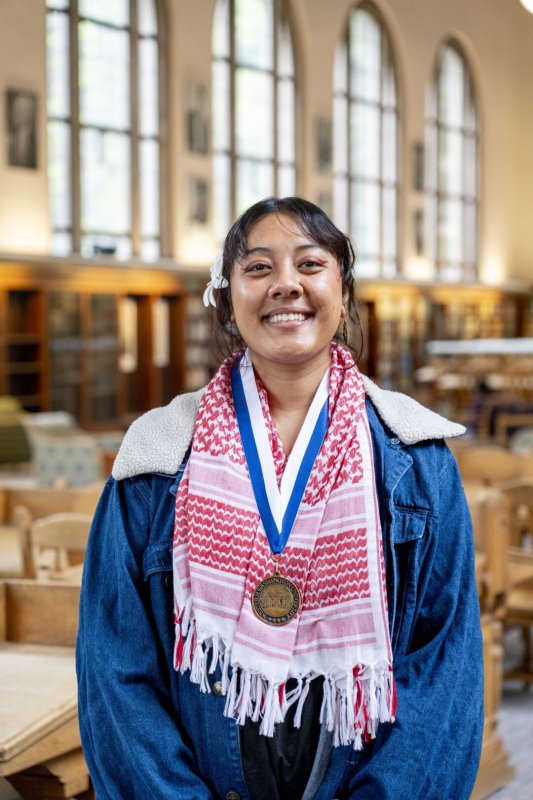Meet the 2024 Presidential Scholars
Seven WWU graduates will be recognized at the upcoming June commencement as recipients of the Presidential Scholar Award.
The award honors the high achievements of students for exceptional scholarship, success in furthering multicultural programs and activities, and other service to the university and community. Presidential Scholars are nominated by faculty members, recommended by deans and formally selected by the president. Presidential Scholars will also wear their award medallions and be recognized during their commencement ceremonies.
The 2024 Presidential Scholars are:
Kyana Renee Grayer
College of Science and Engineering
Kyana Grayer’s significant academic accomplishments complement her engagement in community service and her work to promote diversity and inclusion in STEM fields.
A manufacturing engineering major with a minor in mathematics, Grayer has exceptional analytical skills that have enabled her to collaborate on significant research with faculty and industry partners.
Associate Professor of Engineering and Design Sura Al-Qudah writes that Grayer is “a model student and an inspiring figure in the Engineering and Design community.” And Grayer’s involvement in the community is immense.
She supports her fellow students’ academic success as a math tutor. She also served as president of the Society of Women Engineers, which under her leadership saw a significant increase in engagement among STEM students outside of Engineering and Design, contributing to a more connected and collaborative academic environment.
Grayer also served as a lead member of the Formula SAE team, most recently as Breaks, Pedals and Steering Lead, mentoring fellow students in designing and building these essential systems. She also worked to foster a culture of respect and understanding among team members.
“Her leadership, empathy, and dedication to fostering diversity and inclusion have had a lasting impact on the community,” Al-Qudah writes, “shaping a more inclusive and supportive academic and social environment.”
Gabrielle Laipenieks
College of Humanities and Social Sciences, Social Sciences Division
Presidential Scholar Gabby Laipenieks is capping off her WWU experience by planning and teaching a quarter-length class on climate storytelling and community building with a guiding ethos of climate hope.
The class, Laipenieks’ honors senior capstone project guided by Sustainability Engagement Institute Director Grace Wang, aims to build resilience among young people facing climate challenges.
“Most of Ms. Laipenieks’ endeavors center on making the world a more just place,” writes Political Science Professor Debra Salazar. “Whether in classes on queer or Black politics or on how inequality shapes our politics, she focuses laser like on how institutions and practices can be remade to make the world one in which all kinds of people can thrive.”
Laipenieks majored in political science, minored in both environmental science and honors interdisciplinary studies, and earned a climate leadership certificate. Part of that climate leadership work involved a deep dive into campus signage related to sustainable waste disposal and proposals for improvement.
Her service work at Western is just as varied.
As the local issues coordinator for the AS Office of Civic Engagement, Laipenieks serves as the WWU student liaison to local governments. She’s also a voting member of the President’s Sustainability Council and worked with RE Sources to plan their first youth climate summit.
On top of all that, Laipenieks lends her voice to the WWU Concert Choir.
Ian Schaefer Lorenz
College of the Environment
During his time at Western Ian Schaefer Lorenz has become an integral part of the Institute for Watershed Studies.
Schaefer Lorenz, who is completing a major in environmental sciences with a toxicology emphasis and a minor in chemistry, worked on several of the institute’s long-term research projects on regional water quality. He spent last summer sampling lakes in Whatcom, Skagit, Island and Snohomish counties with the Northwest Lakes Monitoring Program. This summer, thanks to his knowledge and leadership skills, he’ll be leading that program.
“His contributions extend far beyond the classic laboratory and field sampling skills,” writes Angela Strecker, the institute’s director. “He has quickly become a leader among our student employees and is regarded as someone everyone can look to for emotional support and acceptance.”
Schaefer Lorenz, who returned to college after several years away, is also committed to community service and organization and was recognized with the 2024 WWU Student Civic Leadership Award. He’s a long-term volunteer with the Bellingham Food Bank and is a communications leader with the Washington Poor People’s Campaign, which works to raise awareness of systemic racism, poverty and ecological devastation. He also works to support the Bellingham Tenants Union, Community to Community Development and the Coalition to Transform Safety.
Levi Franklin-Montes
College of Business and Economics
Accounting major Levi Franklin-Montes learned the power of mentorship early in life. Since then, he has never been satisfied to excel alone.
As a kid, Franklin-Montes found guidance and support at the Everett Boys and Girls Club, where he began as a participant, eventually became an employee and continues to serve as a volunteer, playing sports, helping with homework and mentoring younger members.
At Western, Franklin-Montes is known for his keen understanding and mastery of accounting principles. In his classes, he played a pivotal role in enhancing the learning environment.
“He had a deep calling to help his fellow students to succeed,” writes Accounting Professor Audrey Taylor, “staying after class and tutoring others who were struggling with the material.”
Franklin-Montes was also selected for internships with prestigious firms such as KPMG and Falco Sult.
Outside of class, he’s a volunteer with Smile Samoa, a nonprofit that provides dental care to low-income communities with limited access.
Max Stone
College of Humanities and Social Sciences, Humanities Division
Max Stone accomplished an extraordinary amount during his three years at Western.
He completed two majors (history and philosophy) and two minors (holocaust and genocide studies. and honors interdisciplinary studies). He served on the WWU Board of Trustees as its student trustee, captained the men’s rugby team, and helped revive the Philosophy Club as its president.
“Max Stone is one of the most remarkable students that I have worked with in my 19 years at Western,” writes Professor Ryan Wasserman.
A first-rate student, Stone impressed faculty with his history thesis, which deftly applied his understanding of philosophy to the discipline of history to explore the history of antinatalist philosophy.
Rugby is another passion of Stone’s. He has twice been recognized as an American Collegiate Rugby All-American, served as both captain and president of Western’s Men’s Rugby Club and coordinated annual free rugby camps on campus. He also organized free rugby camps for kids in British Columbia through the BC Grassroots Rugby Foundation.
“In all his endeavors, he demonstrates leadership well beyond what we expect from students,” writes History Professor Susan Costanzo, “and his pursuits have benefited both Western and the diverse communities of lower British Columbia.”
Amalia Voiss
College of Fine and Performing Arts
After Amalia Voiss survived breast cancer, she enrolled at Western to pursue her passion in costume design.
She’ll graduate this month with not only a major in theatre, but regional and national honors for her design work and a reputation for academic excellence and artistic prowess.
Voiss sets high standards for herself in the costuming studio, and her collaborative style elevates the work of her fellow student designers. A creative, versatile designer, Voiss’ work seamlessly blends traditional theatrical techniques with contemporary influences.
Her designs for WWU’s production of “Hay Fever” won accolades at the regional and national Kennedy Center American College Theater Festival.
Voiss’ costume design work is also inspired by her own experiences as a burlesque dancer and her commitment to creating a community where bodies of all shapes, genders and ethnicities are seen and valued.
“Having recovered from cancer, but still bearing the scars of that battle, Amalia’s work as a performer, artist and designer reflects an important and invaluably diverse voice in the larger artistic community,” writes Assistant Theatre Professor Sarah Jo Monaghan.
Meilani Wilson
Woodring College of Education
Mei Wilson, who graduated in fall 2023 with a degree in early childhood education and early childhood special education, is dedicated to providing high quality experiences for children with disabilities and from culturally and linguistically diverse backgrounds.
She excelled throughout her time in the program even while working long hours to support herself financially, bringing her warm, engaging, authentic perspective to her work.
During her teaching internship, Wilson was known for communicating high expectations for all students while skillfully accommodating student needs in the classroom. She is a consistent voice for the perspectives of students from diverse backgrounds.
As an assistant teacher in the AS Child Development Center, Wilson advocated for the inclusion of more representative books for youngsters, and more support for young students with disabilities.
She also served as an officer in the Pacific Islander Student Association, coordinating campus events and helping to provide a community hub for students of Pacific Islander descent.
“Meilani’s work, service, and scholarship are all exemplary” writes assistant professor Lindsay Foreman-Murray, “as is her commitment to supporting diverse populations of students and relationship building across stakeholders in the university.”
